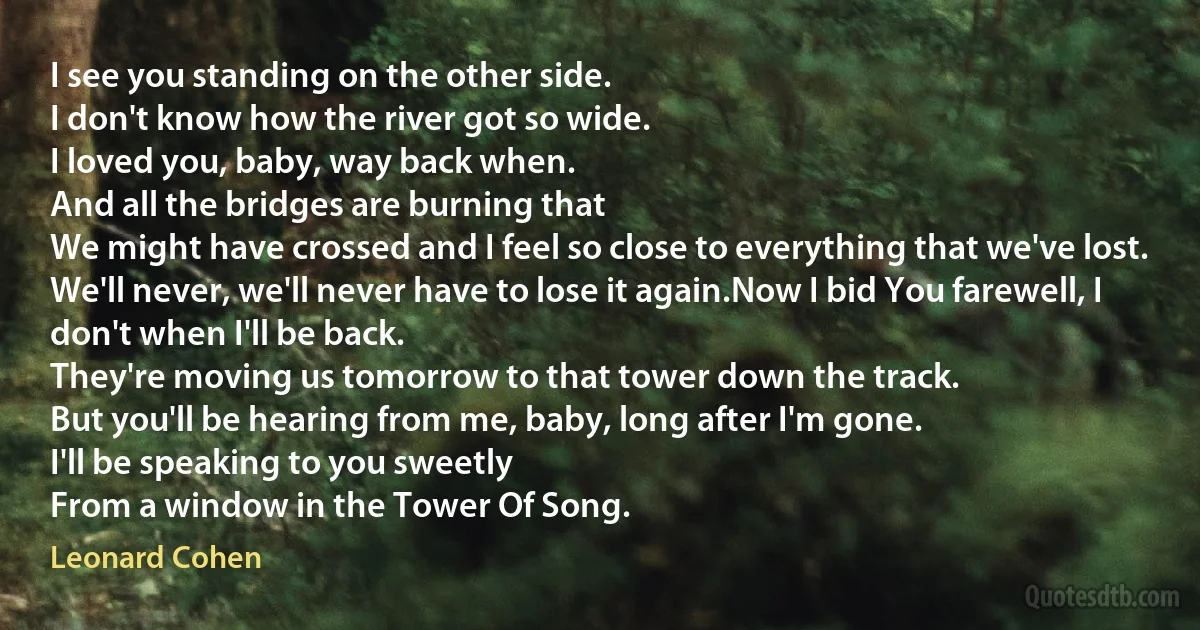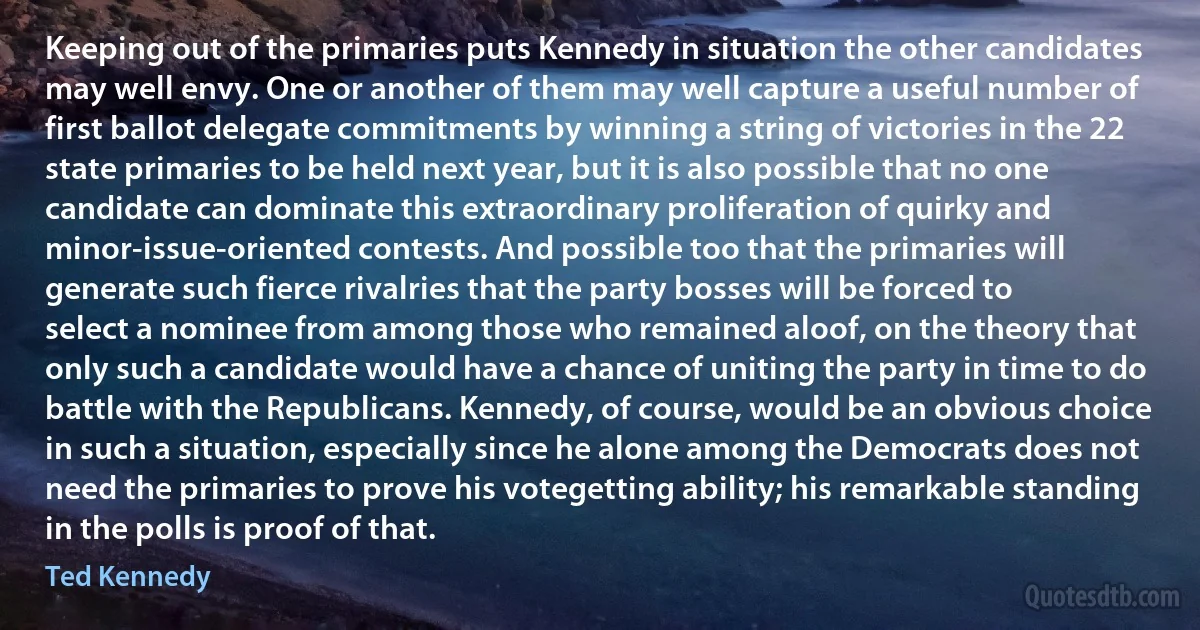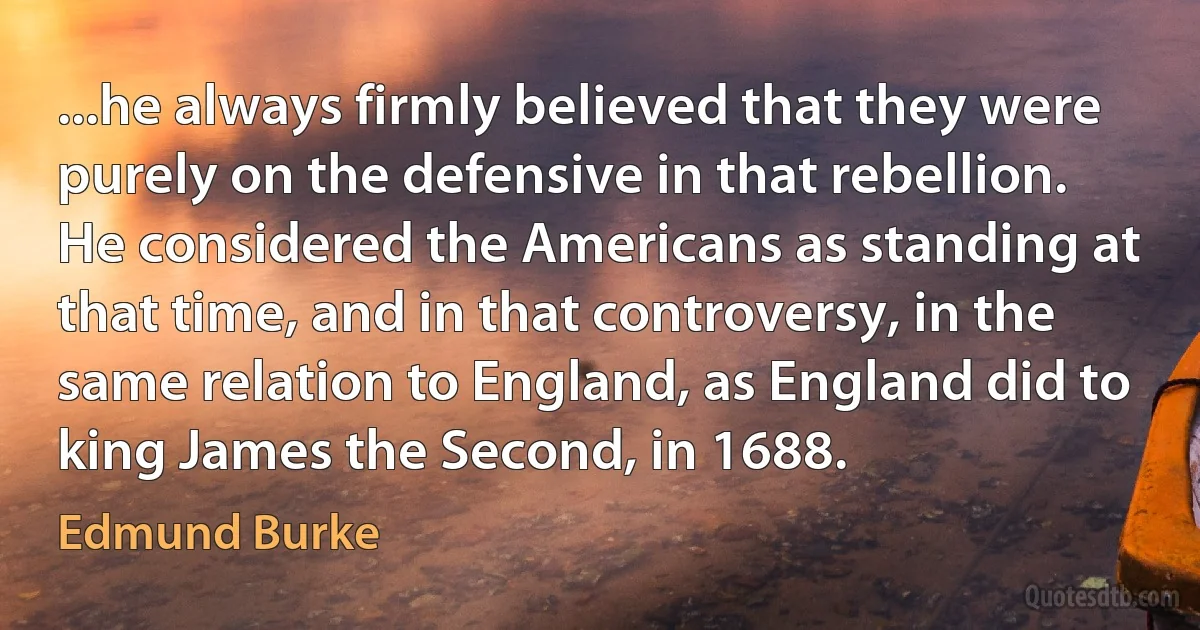Standing Quotes - page 60
What is a symbol? Etymologically speaking, the word σύμβολον comes from σνμβάλλω, to throw-with, to make something coincide with something else: a symbol was originally an identification mark made up of two halves of a coin or of a medal. Two halves of the same thing, either one standing for the other, both becoming, however, fully effective only when they matched to make up, again, the original whole. ... in the original concept of symbol, there is the suggestion of a final recomposition. Etymologies, however, do not necessarily tell the truth - or, at least, they tell the truth, in terms of historical, not of structural, semantics. What is frequently appreciated in many so-called symbols is exactly their vagueness, their openness, their fruitful ineffectiveness to express a 'final' meaning, so that with symbols and by symbols one indicates what is always beyond one's reach.

Umberto Eco
The last great artist. When you think this woman was nearly blind, and often sang standing a good 150 feet from the podium. But her sensitivity! Even if she could not see, she sensed the music and always came in exactly with my downbeat. When we rehearsed, she was so precise, already note-perfect. ... For over thirty years, I was Arturo Toscanini's assistant, and from the very first rehearsal, he demanded every nuance from the orchestra, just as if it were a full performance. The piano, the forte, the staccato, the legato - all from the start. And Callas did this too. ... She was not just a singer, but a complete artist. It's foolish to discuss her as a voice. She must be viewed totally - as a complex of music, drama, movement. There is no one like her today. She was an esthetic phenomenon.

Maria Callas
There are children standing here,
Arms outstretched into the sky,
Tears drying on their face.
He has been here.
Brothers lie in shallow graves,
Fathers lost without a trace.
A nation blind to their disgrace,
Since he's been here.And I see no bravery,
No bravery in your eyes anymore.
Only sadness.

James Blunt
This is not a letter on Pakistan. If it were, I could have written a small book entitled "Glimpses of Pakistan's history". Time does not permit it. The nation is gripped in her worst crisis, standing in the middle of the road between survival and disintegration. Since the birth of Pakistan, crisis has followed crisis in rapid escalation. Millions of lives were sacrificed to create this country. Pakistan is said to be the dream of Mohammad Iqbal and the creation of Muhammad Ali Jinnah, the Quaid-e-Azam. Was anything wrong with the dream or with the one who made the dream come true? Opinions have differed and continue to differ. The next few years will most probably decide the issue, perhaps once and for all, and not without bloodshed. This process is not inevitable but the present policies of the ruling junta are driving this country towards a sad inevitability.

Zulfikar Ali Bhutto
I was telling our new citizens, in the other room before we came in, that one of my most -- I don't know how to say it -- fulfilling moments was, as Vice President, when I went over to Saddam Hussein's god-awful, gaudy palace. And there were, I think, 167 men and women in uniform standing in that palace. As my wife who -- I think, I'm not sure of this -- may be the only First Lady or Second Lady to go into a warzone -- an active war zone. She was with me, and we both stood there as I was able to swear in every one of those military officers as U.S. citizens. And I thought to myself -- I thought to myself, "What incredible justification for all the things that Saddam didn't believe in." And they stood -- and there were a number there who had won Silver Stars -- not -- like you, not citizens when you join -- won Silver Stars, Bronze Stars, Conspicuous Service Medals, Purple Hearts. And I got to swear them in in the palace of a dictator.

Saddam Hussein
[There was a] long standing contention between the sees of York and Canterbury as to the right of either metropolitan to bear his cross erect in the province of the other. ...Peckham, on hearing that his brother [ William of Wickwane, Archbishop] of York had returned from abroad, and was intending to pass through his province with his cross erect, wrote a letter forbidding the clergy to show him any mark of respect, ordering them to shut the church-doors in his face, and threatening all persons, clerical and lay, with excommunication, who ventured to supply him with food, or render him the slightest service.

John Peckham
At Chicago, Hayek put aside his more technical economic work for the development of a social and political theory that became in time the most ambitious and complete synthesis to emerge from the ranks of the post-war Right. Among its themes - the overriding significance of the rule of law, the need for social inequality, the function of unreflective tradition, the value of a leisured class - were many cultivated by Strauss across the campus. Neither thinker, however, ever referred to the other. Did temperamental antagonism, or intellectual indifference, dictate the silence? Whatever the case, latent tensions of outlook between them were to find expression in due course. Schmitt, on the other hand, was never far from Hayek's mind – standing for the prime example of a skilled jurist whose sophistry helped to destroy the rule of law in Germany, yet a political theorist whose stark definitions of the nature of sovereignty and the logic of party, at any rate, had to be accepted.

Friedrich Hayek
If communists are in power, they enforce laws designed to protect their system, their way of life. To them, the horror of horrors is the speculator, that man of magic who has mastered the art of getting something with nothing and who in America would be a member in good standing of his local Chamber of Commerce. "The people, " however are nowhere consulted, although everywhere everything is done always in their name ostensibly for their betterment, while their real-life problems go unsolved. "The people" are a rubber stamp for the crafty and sly. And no problem can be solved without taking the police department and the armed forces into account. Both kings and bookies understand this, as do first ladies and common prostitutes.

Eldridge Cleaver
It is, of course, a matter of history that our military advisers, in face of this appeal from me, still decided to adhere to their view as to the feasibility of the Flanders offensive. Could I have gone behind these exalted Commanders and conducted independent investigations on the spot into the facts and conditions? ... Profound though my own apprehensions of failure were, I was a layman and in matters of military strategy did not possess the knowledge and training that would justify me in overriding soldiers of such standing and experience. Accordingly, the soldiers had their way. And it is one of the bitter ironies of war that I, who have been ruthlessly assailed in books, in the Press and in speeches for "interfering with the soldiers" should carry with me as my most painful regret the memory that on this issue I did not justify that charge.

David Lloyd George
Colonel Perea, was early in the summer of the year 1865, renominated as a candidate to the Thirty-ninth Congress. He made a vigorous campaign and would have been triumphantly elected had he refused to support a few of his most intimate friends, among whom was General Carleton, then commander of the military department, with headquarters at Santa Fe. The opposition concentrated their efforts against General Carleton... His character as a soldier was assailed in all portions of New Mexico. ...Colonel Perea failed of reëlection, but his standing at Washington was such that he was able to control the Federal appointments for the Territory until the close of Johnson's administration in 1869.

Francisco Perea
No man in this fashionable London of yours," friend Sauerteig would say, "speaks a plain word to me. Every man feels bound to be something more than plain; to be pungent withal, witty, ornamental. His poor fraction of sense has to be perked into some epigrammatic shape, that it may prick into me;-perhaps (this is the commonest) to be topsyturvied, left standing on its head, that I may remember it the better! Such grinning inanity is very sad to the soul of man. Human faces should not grin on one like masks; they should look on one like faces! I love honest laughter, as I do sunlight; but not dishonest: most kinds of dancing too; but the St.-Vitus kind not at all! A fashionable wit, ach Himmel, if you ask, Which, he or a Death's- head, will be the cheerier company for me? pray send not him!

Thomas Carlyle
But already in his early works, as in the still-life of 1893.. ..there is a tendency towards the static and well-balanced arrangement. He has a preference for painting in atmospheric conditions which tend to efface the individual forms and emphasize the general outline: Mondrian: 'I often sketched by moonlight - cows resting or standing immovable in flat Dutch meadows, or houses with dead, blank windows. I never painted these things romantically'.

Piet Mondrian
Henry Howard, R.A., was an early friend of my father's; and he and Turner have stayed with us at Heston. I remember, when I was about five years old, going to Penn, in Buckinghamshire, with Howard, Turner, and my father [c. 1812]; all of them in search of the picturesque. We went in a post-chaise, and, when tired, my father carried me pick-a-back. We came to a halt in a grove or copse where luxuriated wild flowers in profusion. It was a charming day; and, though so many 'years bygone' I can see now vividly before me my father and Howard, both standing legs a-straddle, and Turner at a little distance in a ditch, all hard at work at the easthetical. After a while Turner emerged from his retreat with a capital water-colour, with which Howard and my father were in raptures. He said he got into the ditch to avoid the sun, but Howard whispered my father that it was to avoid showing his modus operandi. I have heard this from my father subsequently..

J. M. W. Turner
The population of these Pueblos will average nearly five hundred souls each (though some hardly exceed one hundred), making an aggregate of nine or ten thousand. At the time of the original conquest, at the close of the sixteenth century, they were, as has been mentioned, much, perhaps ten-fold, more numerous. Ancient ruins are now to be seen scattered in every quarter of the territory: of some, entire stone walls are yet standing, while others are nearly or quite obliterated, many of them being now only known by their names which history or tradition has preserved to us.

Josiah Gregg
The most important mine of Jesus-Maria at this time was one called Santa Juliana, which had been the means of alternately making and sinking several splendid fortunes. This mine had then reached a depth of between eight and nine hundred feet, and the operations were still tending downwards. The materials were drawn up by mule power applied to a windlass: but as the rope attached to it only extended half way down, another windlass had been erected at the distance of about four hundred feet from the mouth of the cavern, which was also worked by mules, and drew the ores, etc., from the bottom. On one occasion, as I was standing near the aperture of this great pit, watching the ascent of the windlass-rope, expecting every moment the appearance of the large leathern bucket which they employ for drawing up the minerals as well as the rubbish and water from the bottom, what should greet my vision but a mule...

Josiah Gregg
If God is Omnipresent, why do we not see Him ? Standing by the bank of a pool thickly overspread with scum and weeds, you will say that there is no water in it. If you desire to see the water, remove the scum from the surface of the pond. With eyes covered with the film of maya you complain that you cannot see God. If you wish to see Him, remove the film of Maya from off your eyes.

Ramakrishna
I come back as I always do to the greatness of mankind's curse, and I repeat it with the monotony of those who are always right - oh, without God, without a harbour, without enough rags to cover us, all we have, standing erect on the land of the dead, is the rebellion of our smile, the rebellion of being gay when darkness envelops us. We are divinely alone, the heavens have fallen on our heads.

Henri Barbusse
To suppose universal laws of nature capable of being apprehended by the mind and yet having no reason for their special forms, but standing inexplicable and irrational, is hardly a justifiable position. Uniformities are precisely the sort of facts that need to be accounted for. That a pitched coin should sometimes turn up heads and sometimes tails calls for no particular explanation; but if it shows heads every time, we wish to know how this result has been brought about. Law is par excellence the thing that wants a reason.

Charles Sanders Peirce



